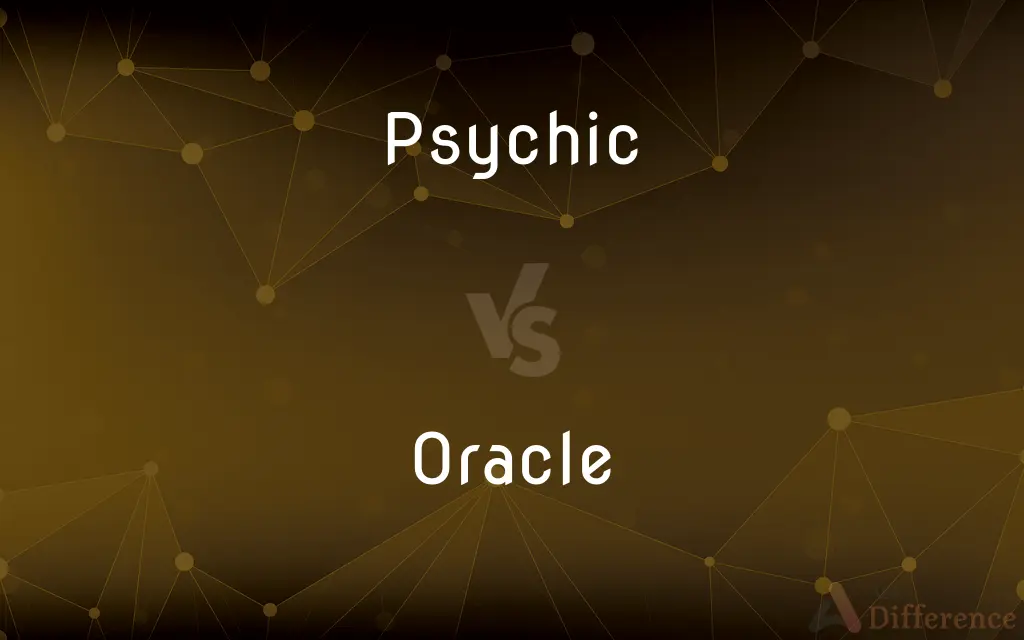Psychic vs. Oracle — What's the Difference?
By Maham Liaqat & Urooj Arif — Updated on April 26, 2024
A psychic is an individual believed to possess extrasensory perception for personal insights or guidance, while an oracle refers both to a person and a method used in ancient times for divine communication or prophecy.

Difference Between Psychic and Oracle
Table of Contents
ADVERTISEMENT
Key Differences
Psychics are individuals who claim to have the ability to perceive information hidden from the normal senses through extrasensory means, such as telepathy or clairvoyance. On the other hand, an oracle in ancient contexts often referred to a sacred shrine where priests or priestesses would deliver messages from the gods.
Psychics often use their abilities for personal guidance, offering insights into an individual’s past, present, or future. They might use tools like tarot cards or crystal balls to aid their readings. Oracles, however, were typically consulted by leaders and common people alike for divine guidance on critical matters, often involving state or community-wide decisions.
The term "psychic" is used more broadly in modern times and can include anyone who offers metaphysical services related to the mind and unseen energies. Whereas an oracle was a specific role or office in ancient cultures, particularly in Greece and Rome, where messages purportedly from the gods were interpreted and conveyed to people.
Psychics may provide services that include psychic readings, mediumship, and spiritual counseling, often on a personal level. In contrast, oracles were integral to religious rituals and ceremonies, and their pronouncements were considered public and influential on a broader scale.
While psychics operate mainly within the realm of personal service today, oracles in history were more formalized, often associated with temples and specific rituals dedicated to particular deities, such as Apollo at Delphi.
ADVERTISEMENT
Comparison Chart
Definition
An individual with extrasensory perception
A person or medium through which advice or prophecy was sought
Usage
Personal insights and guidance
Divine communication and public prophecy
Tools/Methods
Tarot cards, crystal balls
Temples, ritual sacrifices
Cultural Context
Broadly modern, various cultures
Ancient, especially Greek and Roman
Scope of Service
Personal, often private
Public, often state-related
Compare with Definitions
Psychic
Regarded as having a connection with the metaphysical or spiritual realm.
The local psychic was consulted for both minor and significant life events.
Oracle
Represented a formal and sacred communication channel.
The oracle’s pronouncements were considered messages directly from the deities.
Psychic
Often associated with providing personal and spiritual guidance.
The psychic provided insights that helped him make a difficult decision.
Oracle
In ancient times, a person considered to communicate with the gods.
The oracle at Delphi was visited by ancient leaders for guidance.
Psychic
Can utilize various methods such as mediumship or clairvoyance.
The psychic used her clairvoyant abilities to describe unseen problems.
Oracle
A place where such divine communications were given.
The temple served as an oracle where people sought wisdom from the gods.
Psychic
Someone who engages in practices believed to use extrasensory perception.
She visited a psychic to communicate with departed loved ones.
Oracle
Associated with specific rituals and ceremonies.
Consulting the oracle involved precise rituals to ensure the purity of the prophecy.
Psychic
A person regarded as having abilities beyond the normal senses.
The psychic offered to read her future through a set of tarot cards.
Oracle
Historically significant in making public and political decisions.
Oracles were often consulted before going to war or making alliances.
Psychic
A psychic is a person who claims to use extrasensory perception (ESP) to identify information hidden from the normal senses, particularly involving telepathy or clairvoyance, or who performs acts that are apparently inexplicable by natural laws, such as psychokinesis or apportation. Although many people believe in psychic abilities, the scientific consensus is that there is no proof of the existence of such powers, and describes the practice as pseudoscience.
Oracle
An oracle is a person or agency considered to provide wise and insightful counsel or prophetic predictions, most notably including precognition of the future, inspired by deities. As such, it is a form of divination.
Psychic
A person apparently responsive to psychic forces.
Oracle
A priest or priestess acting as a medium through whom advice or prophecy was sought from the gods in classical antiquity.
Psychic
See medium.
Oracle
A response or message given by an oracle, especially an ambiguous one.
Psychic
Of, relating to, affecting, or influenced by the human mind or psyche; mental
Psychic trauma.
Psychic energy.
Oracle
A shrine consecrated to the worship and consultation of a prophetic deity, as that of Apollo at Delphi.
Psychic
Capable of extraordinary mental processes, such as extrasensory perception and mental telepathy.
Oracle
A person, such as a priestess, through whom a deity is held to respond when consulted.
Psychic
Of or relating to such mental processes.
Oracle
The response given through such a medium, often in the form of an enigmatic statement or allegory.
Psychic
A person who possesses, or appears to possess, extra-sensory abilities such as precognition, clairvoyance and telepathy, or who appears to be susceptible to paranormal or supernatural influences.
Oracle
A person considered to be a source of wise counsel or prophetic opinions.
Psychic
(parapsychology) A person who supposedly contacts the dead; a medium.
Oracle
An authoritative or wise statement or prediction.
Psychic
(gnosticism) In gnostic theologian Valentinus' triadic grouping of man the second type; a person focused on intellectual reality (the other two being hylic and pneumatic).
Oracle
A command or revelation from God.
Psychic
Relating to or having the abilities of a psychic.
You must be psychic—I was just about to say that.
She is a psychic person—she hears messages from beyond.
Oracle
In the Bible, the sanctuary of the Temple.
Psychic
Relating to the psyche or mind, or to mental activity in general.
Oracle
A shrine dedicated to some prophetic deity.
Psychic
Of or pertaining to the human soul, or to the living principle in man.
Oracle
A person such as a priest through whom the deity is supposed to respond with prophecy or advice.
Psychic
Of or pertaining to the mind, or its functions and diseases; mental; - contrasted with physical.
Oracle
A prophetic response, often enigmatic or allegorical, so given.
Psychic
A person apparently sensitive to things beyond the natural range of perception
Oracle
Something said that must come true or cannot be countermanded; an inexorable command or declaration.
Psychic
Pertaining to forces or mental processes outside the possibilities defined by natural or scientific laws;
Psychic reader
Psychical research
Oracle
A person considered to be a source of wisdom.
A literary oracle
Psychic
Affecting or influenced by the human mind;
Psychic energy
Psychic trauma
Oracle
A wise sentence or decision of great authority.
Psychic
Outside the sphere of physical science;
Psychic phenomena
Oracle
A fortune-teller.
Oracle
One who communicates a divine command; an angel; a prophet.
Oracle
(Jewish antiquity) The sanctuary, or most holy place in the temple; also, the temple itself.
Oracle
(computing theory) A theoretical entity capable of answering some collection of questions.
Oracle
(cryptocurrencies) A third-party service that provides smart contracts with information from the outside world.
Oracle
(obsolete) To utter oracles or prophecies.
Oracle
The answer of a god, or some person reputed to be a god, to an inquiry respecting some affair or future event, as the success of an enterprise or battle.
Whatso'er she saith, for oracles must stand.
Oracle
The deity who was supposed to give the answer; also, the place where it was given.
The oracles are dumb;No voice or hideous humRuns through the arched roof in words deceiving.
Oracle
The communications, revelations, or messages delivered by God to the prophets; also, the entire sacred Scriptures - usually in the plural.
The first principles of the oracles of God.
Oracle
The sanctuary, or Most Holy place in the temple; also, the temple itself.
Siloa's brook, that flow'dFast by the oracle of God.
Oracle
One who communicates an oracle{1} or divine command; an angel; a prophet.
God hath now sent his living oracleInto the world to teach his final will.
Oracle
Any person reputed uncommonly wise; one whose decisions are regarded as of great authority; as, a literary oracle.
The country rectors . . . thought him an oracle on points of learning.
Oracle
A wise pronouncement or decision considered as of great authority.
Oracle
To utter oracles.
Oracle
An authoritative person who divines the future
Oracle
A prophecy (usually obscure or allegorical) revealed by a priest or priestess; believed to be infallible
Oracle
A shrine where an oracular god is consulted
Common Curiosities
Were oracles always located in specific places?
Yes, oracles were often located in designated sacred sites, such as temples or shrines.
What types of tools might a psychic use in a reading?
Psychics might use tools like tarot cards, crystal balls, or runes to aid their readings.
Can a psychic be considered an oracle?
In modern usage, these terms are distinct; a psychic is individual-focused, while an oracle was historically a channel for divine prophecy.
How do psychics receive their information?
Psychics claim to receive information through extrasensory means such as clairvoyance, mediumship, or psychic readings.
Do psychics follow any particular rituals like oracles did?
Some psychics may use specific rituals to enhance their readings, but these are generally less formalized than the ancient oracle practices.
Why were oracles important in ancient times?
Oracles were crucial for making significant community and state decisions, believed to be guided by divine forces.
How were oracles verified or validated in ancient times?
The validity of an oracle’s pronouncements was often taken on faith, supported by the religious and cultural practices of the time.
What is the main difference between a psychic and an oracle?
A psychic uses extrasensory perception for personal guidance, while an oracle in historical contexts was a formal means of divine communication.
What led to the decline of oracles in history?
The decline of oracles is linked to the spread of Christianity and the rise of scientific rationalism, which discouraged belief in divine or mystical pronouncements.
How does one become a psychic?
Individuals who claim to be psychics often do so based on personal experience of extrasensory perceptions; some may also receive training or mentorship.
What impact do psychics and oracles have on modern culture?
While the influence of oracles has waned, psychics continue to have a cultural impact, often seen in media and sometimes consulted for personal guidance.
Is the role of a psychic respected and recognized universally?
Recognition and respect for psychics vary widely across cultures and communities, often influenced by prevailing spiritual and cultural beliefs.
Can anyone visit a psychic or an oracle?
Today, anyone can choose to consult a psychic, while historically, access to an oracle might have been restricted by societal status or specific procedures.
Are the messages from psychics and oracles always accurate?
The accuracy of messages can be subjective and is often a matter of personal belief.
Were oracles associated with any specific religions or deities?
Yes, oracles were typically associated with specific deities, like Apollo at the Delphi oracle in ancient Greece.
Share Your Discovery

Previous Comparison
Cliche vs. Metaphor
Next Comparison
Ministry vs. OfficeAuthor Spotlight
Written by
Maham LiaqatCo-written by
Urooj ArifUrooj is a skilled content writer at Ask Difference, known for her exceptional ability to simplify complex topics into engaging and informative content. With a passion for research and a flair for clear, concise writing, she consistently delivers articles that resonate with our diverse audience.
















































